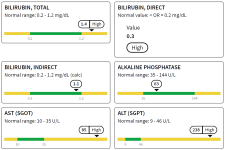Here are my July 7 results:
View attachment 8461
The other things that were tested on July 7 were fine. That includes bilirubin, which tested out of range on August 7 on two measures.
Since I take atorvastatin (Lipitor), an ALT reading of up to three times normal is not much cause for concern. However, the level exceeds that.
Here are my results from August 7:
View attachment 8462
The August 7 results are somewhat better.
The doctor advised me to stop taking retatrutide but opined that the likely cause was the atorvastatin (Lipitor). He said to continue taking the tirzepatide; that it is unlikely to be the cause. The cardiologist lowered my atorvastatin dose yesterday.
I'm debating whether to stop taking the retatrutide. I did schedule, on my own, another blood test for September 2. My inclination is that if that if the ALT & AST are no more than 3 times normal levels to keep taking the retatrutide. I suspect that the cause of the elevated enzymes is the rapid defattening of the liver. "We hypothesize that in our patient, tirzepatide use resulted in rapid mobilization of fat from the liver and was responsible for the elevation in liver enzyme levels." (Sohal, Aalam MD1; Casanova, Luis BSc1; Kowdley, Kris V. MD, FACG1,2.
A Rare Case of Tirzepatide-Induced Hepatotoxicity. ACG Case Reports Journal 11(10)
😛 e01484, October 2024. | DOI: 10.14309/crj.0000000000001484.) It seems retatrutide would be more likely to cause rapid defattening of the liver than tirzepatide because it generally gets rid of more liver fat. When tested a month ago at the gastroenterologist's office, I did NOT have fatty liver although the doctor said he suspected that I had it previously.
If I stop taking retatrutide, my weight loss is likely to stop and I believe that I'll likely gain 10-20 pounds. The dose of tirzepatide that I can tolerate (and which I continue to take) is too low to provide great results. I'd like to lose to 12 more pounds and then stop. I'd then have a BMI of 23.5.
I'm also worried that I'm coming up with intellectual strategies for disregarding the advice of a specialist.

 threadreaderapp.com
threadreaderapp.com



